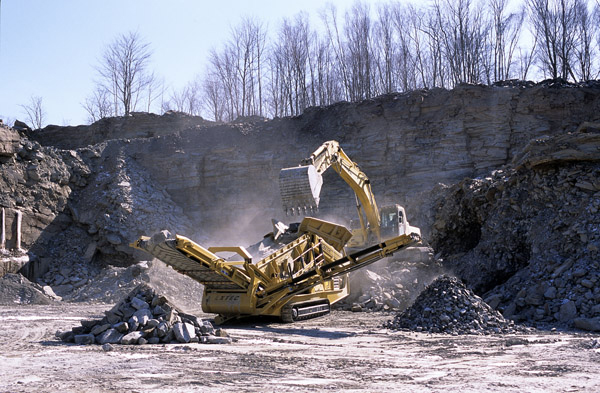
Replacement of screening equipment at Fercav's quarry has helped to safeguard the future of fine Italian ceramics
Like construction materials, demand for ceramics is also high and driving quarries that extract clays used by this industry to invest in new production equipment. Italy's Modena-based clay extraction specialist Fercav is no exception - the company has just invested in a new
The company, which was founded in 1964 by the father and uncle of present owners, Corrado Ferrari and Luigi Portano, is a key supplier of clay to the Marazzi Group, recognised as the world's largest ceramics producer. The company is located in Modena at the heart of Italy's world-famous ceramics industry and employs seven people.
According to Ferrari and Portano, approximately 95% of its annual production is used by the ceramics sector and it was this high demand that prompted the investment in a new heavy-duty scalping and stockpiling machine. The new 28tonne Extec E-7 heavy-duty, track-mounted mobile screen replaces an Extec Robotrac screen and has already doubled the quarry's production levels.
Fercav is a longstanding Extec user and the company approached its local dealer MAIE spa about a combined rental/demonstration of a suitable machine before committing to buying. With the assistance of MAIE, Fercav decided that the Extec E-7 best suited their higher production needs.
According to Extec, the E-7 is a heavy-duty, track-mounted mobile screening and stockpiling system that is designed for use in the most demanding customer applications. The E-7 was developed by Extec's in-house design team over a period of 18 months and was the direct result of customer and market analysis which revealed that existing screening solutions did not adequately cater for screening difficult materials.
The unit is mounted on a sturdy, crusher-type chassis and has a heavy-duty hopper with a 10m3 capacity, which can be adjusted for both length and loading height. The design also includes a double-plated apron feeder and an adjustable angle of incline on the heavy-duty screen box with high throw and vibration characteristics.
Punched plate, heavy duty mesh, rock fingers or grizzly bars can be fitted to the top deck and additional mesh and fingers can also be fitted onto the bottom deck. The machine has also been designed to have a large free flow area from the hopper onto the screen box and then from the screen decks onto the stockpiling conveyors. The rear conveyor, which handles the large sized products, is supported by an impact bed to prevent roll back or lateral movement of material.
Extec claims that the E-7 is ideal for screening of heavy overburden at a quarry face, pre-screening and scalping, recycling of construction and landfill waste, and separation of cohesive aggregates.
Doubling production According to Ferrari, the test was so successful that he immediately stopped renting the machine and decided instead to purchase one of his own. The company said that the most impressive aspect of the Extec E-7 is that it has effectively halved the cost per tonne of production. "The Robotrac was an excellent machine and easily averaged a production level of over 300tonnes per hour," said Ferrari. "The new Extec E-7 costs almost exactly the same to operate but it has almost doubled our production levels." Although clearly impressed by the output-to-cost ratio of his new purchase, Ferrari is similarly pleased with many other aspects of the Extec E-7, particularly the machine's mobility. Ferrari states that the machine's exceptional manoeuvrability ensures that the loading shovel used to feed it never has to travel more than 10m, thereby minimising owning and operating costs still further.













